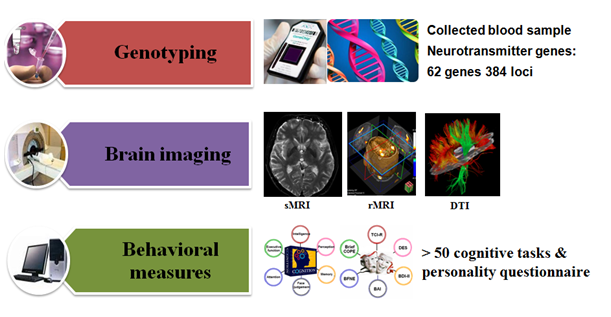To explore the individual differences in learning and memory, we initiated the Gene-Brain-Behavior Project (GBBP) at Beijing Normal University in 2007, which recruited more than 500 healthy Chinese college students. For each participant, we collected comprehensive behavioral measures (over 50 cognitive tasks and psychological questionnaires), neural data (structural and resting state functional MRI, and DTI) and genetic data (384 loci in 62 neurotransmitter related genes).
Several interesting results have been obtained that can shed light on the genetic, neural and cognitive basis of individual differences in learning. For example, we found significant individual variations in false memories (tested using by misinformation and DRM), which are related to cognitive abilities in different domains (from perception to intelligence). Furthermore, false memories induced by different paradigms might arise from different underlying cognitive processes, and individuals with particular combinations of personality characteristics and lower cognitive abilities were more vulnerable to the misinformation effect (Zhu et al., 2010, Memory; Zhu et al., 2010. Personality and Individual Differences).
Gene-Behavior association studies revealed that the alpha-2B-adrenergic receptor gene influences response inhibition (Lei et al., 2012, Neuropsychopharmacology), the neurotensin receptor 1 gene (NTSR1) polymorphism is associated with working memory (Li et al., 2011, Plos One), and the serotonin transporter gene-linked polymorphic region (5-HTTLPR) influences decision making under ambiguity and risk (He et al., 2011, Neuropharmacology).
Using Gene-Brain-Behavior association approach, we explored the relationship between dopamine genes, hippocampus and working memory performances (measured by 2-back task). We found the association between hippocampal volume and working memory performance, which is modulated by the NTSR1 gene polymorphism (Li et al., 2011, Plos One; Li et al., 2013, Neuroimage). Second, we found that COMT rs4680 was associated with working memory performance and hippocampal volume (Wang et al., 2013, Genes, Brain and Behavior). Third, we are exploring the accumulating effect of whole dopamine system genes on working memory. These findings have largely enriched existing studies on the neural and genetics basis of working memory.
The Gene-Brain-Behavior project at Beijing Normal University.
